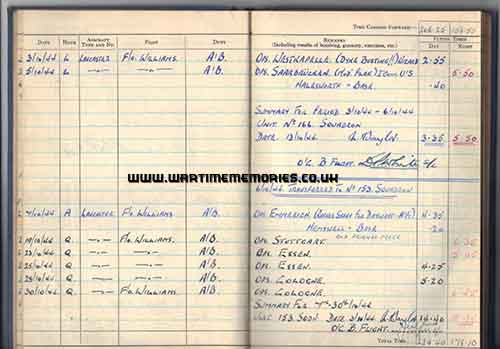F/Sgt. Arthur Herbert Taylor DFC
Royal Air Force 153 Squadron
from:Urmston, Manchester
Westkapelle, The Netherlands, A bombing raid now fifty-six years ago, remains a subject of keen interest to the residents of the strategically located island of Walcheren.
On October 3, 1944, the earth in and around the Zeeland coastal village of Westkapelle shook when Allied bombs aimed at nearby North Sea dikes detonated. The purpose of Operation Infatuate was to breach the Walcheren's dikes as a prelude to battle with the Germans who on the island controlled the approach to the port of Antwerp. The bombing which took the lives of 159 inhabitants of Westkapelle, later was repeated at Vlissingen and Rammekens.
A local amateur historian recently has reconstructed the events of that fateful day in an English-language book called, "We Never Blamed the Crews The Flooding of Walcheren Island October 1944". Author Paul M. Crucq was able to tap into all kinds of military information about the operation and extensively used flight logs, diaries and personal memories of people involved in Operation Infatuate, particularly the pilots and their crews.
Five Mosquito war planes opened the raid to drop markers for the ensuing bombing. The raid by 29 squadrons involved 240 Lancasters, each carrying eight bombs, one 4,000 pounder, six 1,000 pounders and one 500 pounder. A 400 metre error by one of the marker planes led to disaster which was compounded by worsening weather and loss of visibility due to smoke from the explosions. Part of the southern section of the village was bombed as well causing, directly or indirectly, the death of 159 people.
Widening the gap
The fourth bombing run finally breached the dike. The next waves of bombers then tried to widen the gap, dropping their loads more precisely by flying at a much lower altitude. The raids met with little resistance from German pillboxes which only were equipped with surface-to-surface and light machine guns. The book, of which the title fully voices the sentiments of most if not all inhabitants of Westkapelle at that time, has been well received, especially by RAF veterans, many of whom had largely been unaware of the tragedy among the civilians.
Crucq since has received many letters from crew members recounting the events. Following the raids, the island was inundated causing extreme hardship to civilians whose conditions worsened - many who had not evacuated lived on lofts - when invading Allied forces - Canadians and British - slowly pushed tenaciously fighting Germans back off the island. With Walcheren secured, the Allies were able to substantially cut their long supply lines in anticipation of the liberation of the rest of occupied Netherlands, and a final dash into the heart of Germany.

.jpg)
